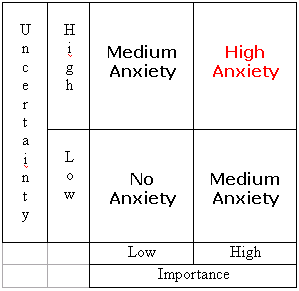Managing ambiguity or uncertainty is a key life skill…
- Why is it that some of life’s challenges make us, while others are destined to break us?
- Does success depend on the nature of the challenge or is it more related to our personal approach?
Our ability to deal effectively with uncertain situations or “managing ambiguity” is a life skill that is gaining recognition, mostly stemming from Daniel Goleman’s work on Emotional Intelligence. Let’s take a look at what managing ambiguity is all about.
Go Ask A Fortune-Teller
Every second of every day, someone, somewhere will be moving house, switching careers, or dealing with some other significant life change. Even fortune-tellers can’t predict how things are going to turn out, so you have to get comfortable with not knowing precisely what is going to happen. That’s managing ambiguity!
Handle challenges better by keeping your thinking crystal-clear
The problem is when we get anxious our ability to think clearly gets worse. So the key is to manage anxiety levels and have loads of spare mental capacity to deal with the unexpected.
Take a moment to consider this relationship;
ANXIETY = IMPORTANCE x UNCERTAINTY
If something is very important to us, we will wish dearly for success and have some emotional attachment to the outcome of the challenge.
If something is uncertain and the outcome not guaranteed, we lose sleep worrying about what is going to happen.
Both of these are likely to give us more anxiety.
Here’s a table to better explain the relationship between Anxiety, Importance and Uncertainty, or Ambiguity.

A nasty pair
The toughest combination is when something is both important and uncertain. Will I sell my house? Am I going to be made redundant? We need to lower our anxiety levels wherever possible by taking a good hard look at the importance and uncertainty associated with the challenge.
Assessing the challenge
How important is it?
The level of importance is something that you and only you can determine. Take a moment to stop and think – do I really, truly care about this? On a scale of 1-10, is this life threateningly important (10) or something altogether more trivial (1)? Sometimes we lose perspective on what is actually important to us, and inadvertently fuel our own anxiety. What you think may be an 8 is actually a 4 when you take time to think clearly about it.
What’s the outcome?
A situation is uncertain when there are a multitude of outcomes, not all of them desirable. Build up your tolerance for ambiguity by remembering that even in the toughest situation, there are always two sound principles you can rely on.
Principle 1 – you can always control your response to a situation. Your reaction is your choice.
Principle 2 – recognising what you can and can’t control will increase the likelihood of a successful outcome and lower your anxiety.
Think clearly about each of the possible outcomes? List all of them, even the scary ones that only crop up in the dead of the night. So you are made redundant – there is plenty you can do to make the most of that situation. Maybe the cheque will fund that teaching qualification you’ve always dreamt of?
Sort it out or fugeddaboudit
Take each outcome in turn and figure out how likely it is to happen, and what you can actively do to influence it. When you’re done, you’ll have a comprehensive action plan, bettering your chance of success. So even if the worst thing does happen, you’ve already done something to lessen the impact and know what you can do next.
And for all the things you can’t control or influence, forget them. Write them down and then scrunch up the paper and throw it away. At some point you have to let go.
Challengers Ready!
Managing ambiguity can be learned and improved with practice. Be more successful and rise to the challenge by;
- Understanding the relationship between anxiety, importance and uncertainty.
- Managing your anxiety and increasing your spare capacity by learning relaxation techniques.
- Deepening your understanding by using the clear thinking approach with a colleague, partner or friend.
Managed well, uncertainty can be exciting rather than frightening. Keep your thinking clear and ambiguity can be your friend.